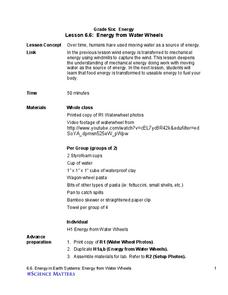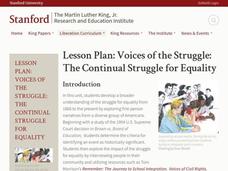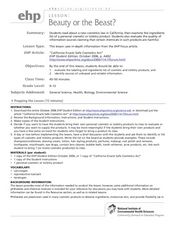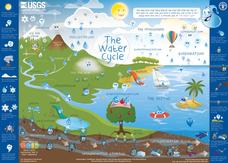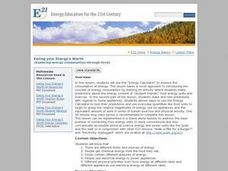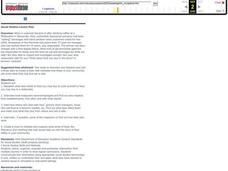K12 Reader
Natural Resources
What natural resources are available in your area? Your learners can consider this question after reading a brief passage about natural and renewable resources. After reading, class members respond to five questions related to the reading.
Science Matters
Energy from Water Wheels
Historians believe the first vertical water wheel was invented in Rome during the Augustan Age. The sixth lesson plan in the series of 10 has scholars experiment with designing their own water wheels. Through testing various pastas and...
National Park Service
Living & Non-Living Interactions
What better way to learn about ecosystems than by getting outside and observing them first hand? Accompanying a field trip to a local park or outdoor space, this series of collaborative activities engages children in learning about the...
Stanford University
Voices of the Struggle: The Continual Struggle for Equality
As part of a study of the Civil Rights Movement from 1868 to the present, class members examine first person narratives, the Supreme Court case Brown v. Board of Education, and other significant events in civil rights history. They then...
Teach Engineering
The Great Pacific Garbage Patch
The Great Pacific Garbage Patch is one of several garbage patches around the world where garbage accumulates naturally. As part of a GIS unit that combines oceanography, environmental science, and life science, class members investigate...
Curated OER
Pocumtucks in Deerfield
As part of a study of colonial and Native American history, class members focus on the beliefs and land use of the Pocumtucks, who settled near Deerfield, Massachusetts. Students examine their beliefs about land use and ownership, the...
Curated OER
Beauty or the Beast
Does the FDA really intend to protect public health? Spark a debate in your chemistry or health class by using this article, titled "Beauty or the Beast." It questions the safety of cosmetics and toiletry products, govenment regulations,...
Curated OER
The Geography of China
Viewers will love this field trip to China, complete with information about China's economy, topography, geography, climate, and demographics. Maps and photos help to support the claims in the slides, especially in some interesting...
US Geological Survey
Water Cycle Poster
How many parts make up the water cycle? How many things on Earth rely on water as a system? Learn more about the water cycle in an informative and colorful poster. Print and hang, or project the graphic in the classroom for optimal use.
Curated OER
What's Organic?
Students discuss background information presented by the teacher and read dictionary definitions for the words "organic" and "synthetic." In this gardengin lesson, students complete a worksheet on the material. Students grow and compare...
Curated OER
How We're Connected
Students take a survey in order to find out how they live in relationship to the environment. They take the time to investigate the differences between a need and a want. This is done as part of the self-assessment. Students also study...
Curated OER
Kernels of Wisdom: Investigating Natural Variations in Corn
Here is a brain-popper! Corn, or more appropriately, maize, was intentionally domesticated by humans around 9,000 years ago and over a period of hundreds to thousands of years! Genetics and botany researchers have collaborated to find...
Curated OER
From Seeds to Salad Bars
Learners examine different plants and discover how they can be sources of healthy food choices. They identify tips on how they can eat more fruits and vegetables during the day. They also prepare a recipe.
TED-Ed
How to Speak Monkey: The Language of Cotton-Top Tamarins
Tamarin monkey language can be categorized by stem upsweep, duration, peak frequency, and frequency change. Although other complex terminology is used to describe the 38 calls of this species, the video is easy to follow and a...
Curated OER
Amphipod Ecology
Learners count amphipods under kelp wracks of varying ages to explain how long it takes for them to find their food source. They collect and represent the data.
Curated OER
Eating your Energy's Worth
Students calculate the amount of electrical energy used in a week in food units. They create ways to reduce energy use. Students discuss the different forms and sources of energy. They discuss how people use electrical energy to power...
Curated OER
Environmental Mathematics
Eighth graders determine food that they would need to survive in the wild. They graph the best foods for their environments and rate the survivability rate for each member of their group.
Curated OER
Energy Defined
Fourth graders complete activities to study the sources of energy and forms. In this energy lesson, 4th graders discuss the origin of energy and define it. Students participate in several experiments to further study energy including a...
Curated OER
March Market
Students role play a living wetland food web. They trace the food web associated with the items in their lunch.
Curated OER
McDonald's and 'Spiked' Coffee
Students explore food safety. Pupils research what laws relate to food you cook yourself, food you may buy in a restaurant and food bought in a grocery store. They interview food inspectors. Students create a chart to indicate who...
Curated OER
Critics of Cuisine
Young scholars role play the role of food critics. Using recipes, they make nutritious meals at home following specific directions. They write reviews of their recipes and the products they used to make them. They share their review...
Curated OER
The shop is important
Pupils consider where food comes from and how it gets to them. They identify where shops are found and visit one to investigate how it operates.
Curated OER
How Much Is There To Eat?
Tenth graders compare the relationship of food production and population in India with the southern regions of the United States.
Curated OER
Explorit's Green Salad Quiz
In this food history worksheet, students read the information about the history of food and salads. Students select the correct answer for the 6 related questions.
Other popular searches
- Food Sources
- Food Origins
- Aboriginal Food Sources
- Esl Food Sources
- Food Origins Of
- Science Sources of Food



